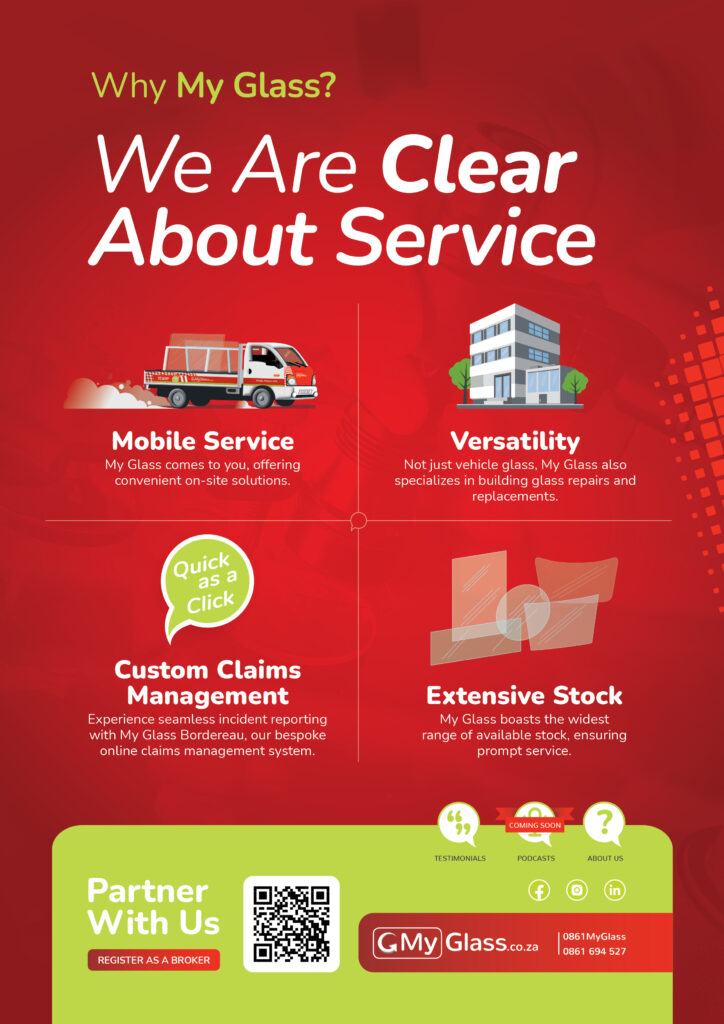
As a 36-year glass industry veteran I would consider myself as reasonably experienced. I am also the founder partner and MD of My Glass, a company with a national network of over 150+ independently owned and managed mobile service teams.
In this context I would like to raise a concerning trend that seems to be gaining momentum, which is “sub- contracting” or glass broking. What is “sub-contracting” and why is it a concern as surely any form of entrepreneurship should be welcomed and supported, especially in the context of South Africa’s current dire economic climate?
Normally I would agree and support any form of entrepreneurship HOWEVER in the context of a safety critical item such as a windscreen and even certain building glass applications, I believe the model unfortunately opens and exposes the insurer, fleet manager or body corporate to significant risk with possible injuries or worse, not to mention the PR and reputational damage.
We all understand that managing and reducing the ACOC is critical in every business in today competitive climate. We also understand that when an opportunity to cut costs presents itself, naturally want to take advantage of the offering, because it ticks the box. BUT does it really?
What are the fundamental differences between a “glass broker”, Franchise or a License model?
What are the fundamental differences between a “glass broker”, Franchise or a License model?
- A glass broker generally operates by appointing a non-branded, independent subcontractor to carry out the work /fitting on behalf of the broker. The broker generally supplies the glass and pays the subbie a nominal fee to fit the glass.
- A franchise generally operates under a strict and structured business model, where the franchise owner must comply with the rules, branding, processes, systems, and SOP’s. Generally, the franchisee is also restricted to the products and brands that may use in the business.
- A licensee model is like a franchise model in relation to the branding, rules, processes, systems branding and SOP’s, but it allows the business owners freedom to select from a range of approved products and brands. The model however allows the Licensee more freedom to use their natural entrepreneurial flair.
So, what is the concern about the Glass broker model? The model reduces costs and gets the job done I hear you say. Yes, it does, but that is exactly the problem, it is often too simple. Unless of course the missing components are not important to you and the high risks are worth the cost savings. A windscreen is not just another commodity. A windscreen and in fact any automotive glass, or even building glass are in most applications, safety critical items.

We are Clear About Service
- Mobile Service: My Glass comes to you, offering convenient on-site solutions
- Versatility: Not just vehicle glass. My Glass also specializes in building glass repairs and replacements
- Custom claims management: Experience seamless incident reporting with My Glass Bordereau, our bespoke online claims management system
- Extensive stock: My Glass boasts the widest range of available stock, ensuring prompt service.
Insurers are forced to rely on their approved service providers to ensure:
- The brands fitted are “approved” and meet the required quality and safety standards. Unfortunately, the SABS stamp does not automatically mean the glass is a quality product nor does it translate to the glass fitting properly. To save costs some brokers are using brands which do not have a good reputation for quality and fitment and that could crack again because the cross curvature / shape does not conform 100% to the shape of the vehicle’s body.
- The brand / type of polyurethane must comply with the OE specifications to ensure it will not damage the vehicle and will not fail in an accident. Using the incorrect Polyurethane could actually erode the vehicles body. This is a critical aspect of the fitting process which cannot be stressed enough. To cut costs, some fitters use inferior products, even resorting to using silicone to fit glass. Remember subbies are often only paid a nominal fee to fit the glass so economics often dictates what products they use. Buying at the “cheapest” possible price is often their only option.
- That every subbie is suitably insured for defective workmanship and PL (Public Liability).
- The methodology being applied by the subbies complies with the relevant SABS/SANS specifications.
- Compliance with the AAAMSA specifications relating to replacing building glass.
- A proper evaluation of any new subbie is conducted, and appropriate ongoing accredited training is provided.
- There are sufficient processes (overt and covert) in place to mitigate the risk of fraud taking place.
- The effective management of sundries. Are clips being used or are the mouldings / beading being “glued/bonded” in place to save costs? This behaviour will prove to be costly with future replacements as the moulding will most probably need to be replaced with the next fitment.
- Are the fitters and vehicles all branded and easily identifiable? In today’s crime ridden streets, is there the possibility of someone mascaraing as the appointed SP to gain access to the client’s home, office, or vehicle? What actions are being taken to mitigate this significant risk?
- Are the SLAs being managed to ensure compliance or does the broker rely on manual feedback?
- All documentation and client information are being managed and handled in accordance with POPIA (PROTECTION OF PERSONAL INFORMATION ACT).
The list goes on and on…
Each of these items collectively contributes towards ensuring clients receive a correctly fitted quality product. Leave any of these important items out of the business processes and the risk factor begins to escalate. I believe every business wants to be as cost efficient as possible but the danger of removing any layer or measure of “control,” could prove to be an elevated risk and dangerous strategy. We do not want the industry to degrade into a free for all, purely driven by the need for an unrealistic or unsustainable ACOC. Another concerning fact about the broker model is the fitting fee generally being paid to subbies is often insufficient to grow or sustain a glass business, never mind sustain the business which should have all the necessary the management and controls, IT systems as well as branding etc which most reputable insurance companies understandably expect and demand.
Let us also be honest, what other choice does the SMME really have to negotiate or leverage his or her fitting fee as there are another 10 SMME’s in line, all willing to do the same job… it is sad fact of a desperate situation. It would cost prohibitive and almost impossible for each insurance company to effectively manage 100s of glass service providers nationally, to ensure that every product, process, and management thereof is being complied with. Hence the reliance on the SP with a national footprint to ensure 100% compliance within their own respective networks.
Every step omitted from the business or operational processes, or which is not being managed correctly will expose the principal insurer and client to an escalating risk. In closing, when selecting a service provider who claims to have a national network, I would recommend that you ensure that every single aspect, process, management, and IT system is in place, as ultimately who going to bear the eventual “costs” for noncompliance? The growing glass broker trend is a combination of ignorance, fuelled by the need to reduce the ACOC’s, mixed into a dire economy. A potentially dangerous mix which could prove very costly in the long term.
If you have any related concerns, I would be glad to advise you and or review your current glass SP arrangements. Please feel free to contact me to setup a confidential discussion: gary@myglass.co.za

